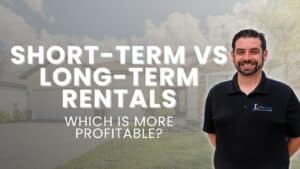Many moving parts come together to create a successful rental property experience; reliable tenants are among the most important. Owning a rental property has significant benefits. However, it is not always the easiest venture to take on. All Tampa rental property owners and managers are bound to face difficult tenant situations at one point or another. While encountering a challenge is not an ideal situation, the way you overcome the obstacle will set the tone for the success of your rental property and financial returns.
As a professional property manager, here is my guide to proactively handling difficult tenant situations!
1) Outline a Lease Agreement With All Written Policies
A lease agreement lays the groundwork for a successful and smooth lease. It is a written agreement between two parties: the property owner/landlord and the tenant(s). This agreement outlines all aspects of the lease, from the lease term and rent amount to rules, regulations, and consequences for violating the agreement.

Lease agreements set the terms and conditions for the lease term to regulate and protect both the property owner and the tenant. As a legally binding contract comprising legal responsibilities and protections, lease agreements can be confusing and intimidating. If you have never dealt with a lease agreement, it is common to not understand the terms and conditions to their full extent upon first reading. However, all Tampa property owners need to enforce this agreement.
Once it is signed and active, your tenant is expected to comply with all aspects of the lease agreement. Knowledge of a lease agreement encourages tenants to follow the rules, avoid disturbances, and keep the property in good condition. Consequences for failing to comply with the lease agreement can result in monetary penalties, legal consequences, and, in some cases, eviction.
If you become aware of lease agreement violations throughout the lease term, you must enforce the written policies to minimize further conflict or damage. The lease agreement is there for a reason—failing to enforce it may give the impression that you will not hold your tenant accountable for their actions and violations.
Some essential aspects to outline in all lease agreements include:
- Names of all tenants that will reside on the property
- Rent amount and due date
- Lease start and lease end dates
- Security deposit amount and return terms
- Utilities, appliances, and services included in the rent
- Pet policy
- All rules of the tenancy
- Repairs and maintenance
- Property owner’s legal right to entry into the property
- Lease break or lease default regulations and consequences
Setting the expectations, rules, and regulations through your lease agreement can help avoid and combat difficult tenants.
2) Communicate Effectively and Respectfully With Tenants
Effective and respectful communication can often help mitigate the situation when dealing with difficult tenants. If a tenant has violated the lease agreement or caused a disturbance, your first step should be to communicate with them. As a property manager, I know it can be frustrating to deal with lease violations—your rental property is a valuable asset, and you want to maintain its condition and profitability. However, it is essential to remain levelheaded and rational.
In some cases, tenant issues are a misunderstanding and can be fixed with a sincere conversation. While not always the case, it is essential to attempt to get to the root of the issue and speak directly with the tenant before taking further action. Forms of appropriate communication vary depending on the situation and specific lease agreement.
It is essential to remember that, unless given consent prior or dealing with an emergency, it is illegal to show up to your tenant-occupied rental property without reasonable notice of 24 hours. Set a time to meet in person or over the phone to discuss the issue and discover potential solutions. Whether it’s a late rental payment or multiple neighbor complaints, understanding the issue is the first step in fixing it.

On the other hand, sometimes a tenant’s situation is difficult because they need constant communication. While it is customary to communicate with tenants regarding maintenance requests, issues, or payment troubles, you should not be communicating with your tenant daily. Some difficult tenants find the need to notify their landlord of minuscule details and constantly need help with the property. If you’re receiving multiple text messages, emails, missed calls, DM’s, etc., it is time to set a boundary with your tenant. Though addressing your tenant’s concerns is essential, it is up to your discretion to decide whether or not their constant inquiries are valid.
While never-ending texts or calls are not valid reasons to kick your tenant out, they are valid reasons for a non-renewal. Although retaining tenants is essential to generating a continuous income, lease renewals are typically sent to reliable and low-maintenance tenants. If your current tenant is constantly badgering you with problem after problem, they are not the best candidates for a lease renewal.
3) Identify and Address Issues and Complaints
Addressing tenant issues promptly is crucial for handling and de-escalating difficult tenant situations. Even if you have not yet worked on a solution, it is important to acknowledge an issue as soon as it arises. Addressing the situation promptly shows your tenant you are serious about understanding the issue and finding a solution.

Some complaints and issues are more urgent than others. Rental property challenges come in all shapes and sizes; some may require an immediate solution, while others require legal proceedings or weeks of mitigation.
Some common difficult tenant situations include:
- Late or failed rent payments
- Security concerns
- Disturbances and neighbor complaints
- Unauthorized tenants or pets
- Lack of property upkeep
I highly recommend conducting quarterly inspections to ensure the lease agreement is upheld. Quarterly inspections allow Tampa property owners or managers to check the property’s condition. These inspections can provide insight into discovering lease violations such as unauthorized tenants or pets, property maintenance and upkeep issues, or illegal activity.
If your tenant is violating the lease agreement, it is essential to take action immediately. Putting off enforcing the rules gives the impression that you are not serious about upholding the lease agreement.
4) Enforce the Lease Agreement and Take Legal Measures
Sometimes, a verbal conversation or warning does not resolve difficult tenant situations. When your tenant continuously violates the lease agreement or fails to pay rent, issuing a written notice shows the severity of the problem and your commitment to finding a resolution.
There are two types of written notices I recommend to initiate the eviction process:
- A 3-day notice to pay or vacate
- A 7-day unconditional quit notice
3-Day Notice to Pay or Vacate
A 3-day notice to pay or vacate is used when your tenant has failed to pay rent. While rent is typically due on the first of the month, offering a grace period of 2-5 days is standard. This grace period allows your tenant to submit funds without a penalty, such as a late fee. If your tenant has failed to pay past the grace period, you must take action immediately. The first step should be communicating with your tenant and asking them if they can pay rent by the following day. If they fail to do so, the next step is a 3-day notice. This 3-day notice gives them the option to reconcile the funds within three business days, excluding Saturday, Sunday, and court-observed holidays, or vacate the property.
7-Day Notice to Cure or Quit
If your tenant’s lease violation does not involve late payments and reconciling funds, I recommend issuing a 7-day notice to cure or quit. Lease violations that warrant a 7-day notice may include illegal subletting, unauthorized pets or tenants, severe damage or unauthorized change to the property, or health and safety violations. This notice is similar to the 3-day notice in the fact that the tenant has 7 business days to cure the issue, or vacate the property.

Eviction Proceedings
If your tenant fails to comply with a 3-day or 7-day notice, the next step is to file for an eviction. You can file for an eviction lawsuit with your county clerk’s office when you provide the name(s) of the tenant(s), the property address, the reason for eviction, and proof of the 3-day or 7-day notice issued to the tenant.
An eviction may take 3-4 weeks in the state of Florida. Like any other court proceeding, proper investigation must be executed, and proof must be found. An eviction does not rely on a property owner or manager’s belief that the tenant should be evicted; it relies on proof that the tenant did indeed violate the lease agreement.
A tenant can also contest or fight the eviction. After the notice is delivered, the tenant has five days to do so. In this case, the eviction process would take longer than it would have if there had been no objections. If tenants do not contest, they must move out of your property.
5) Hire a Professional Tampa Property Manager
The most effective way to handle difficult tenant situations is to hire a professional property manager. Many Tampa rental property owners have other responsibilities in addition to managing their rental property; however, managing a rental property can be a full-time job. Managing a Tampa rental property and handling difficult tenant situations is a big time commitment and requires knowledge of the rental industry and legal policies.
When you hire a property owner, you no longer have the stress of dealing with tenants, enforcing the lease agreement, or navigating legal proceedings independently. At The Listing Real Estate Management, our professional property managers have years of experience managing all aspects of Florida rental properties on behalf of the property owners. Our talented property manager team takes care of everything from responding to tenant complaints to eviction proceedings if necessary.
In addition to handling difficult tenant situations, our full-service property management includes:
- Property marketing and leasing
- Tenant Screening
- Rent Collection
- Maintenance and Repairs
- Rental property accounting
- Rental management guarantees
We know that handling tenant issues alone can be stressful, but we’re here to help. At The Listing, we guide our clients to success and prosperity, all while ensuring your Tampa rental property and tenants are taken care of. If you’re searching for a proactive property management solution, contact us today at The Listing Real Estate Management. We’re your boutique Tampa property management company!
Copyright © 2017-2024, The Listing Real Estate Management. All Rights Reserved.





